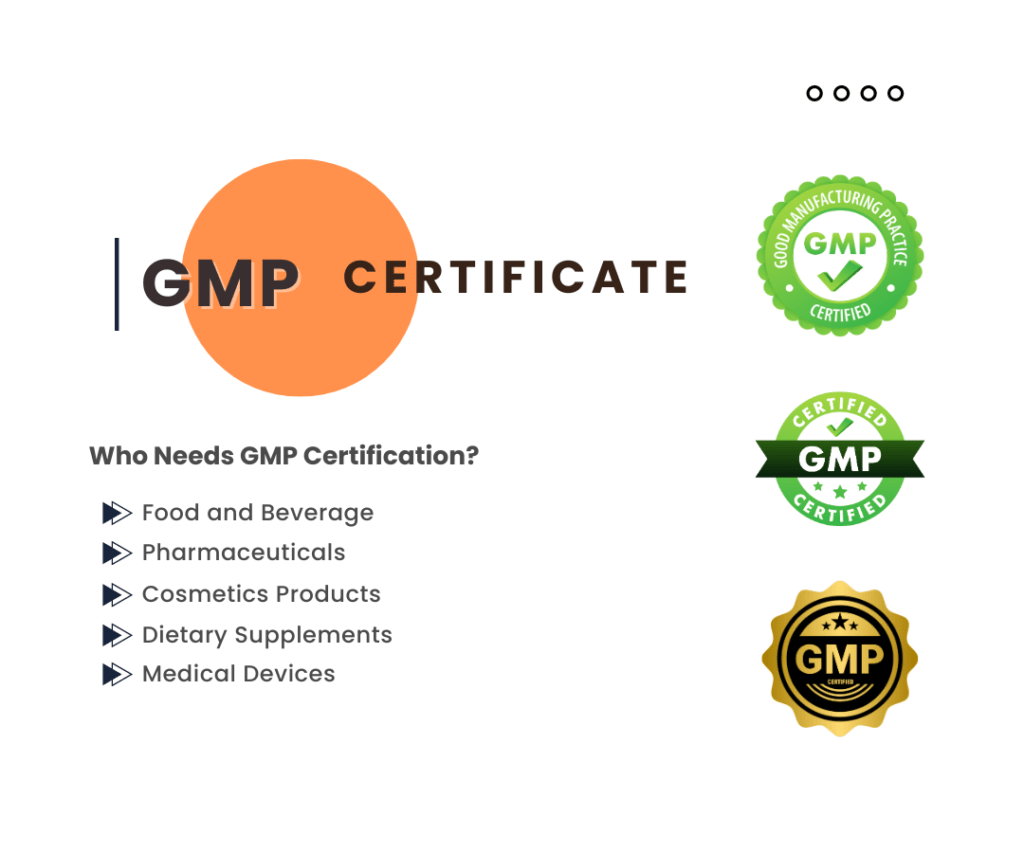GMP Certification
- Home
- GMP Certification
GMP Certification, short for Good Manufacturing Practice Certification, is a crucial standard in various industries, particularly pharmaceuticals, food, and cosmetics. It ensures that products are consistently produced and controlled according to quality standards appropriate to their intended use and as required by regulatory agencies.
GMP Certification signifies adherence to stringent guidelines concerning manufacturing processes, sanitation, personnel training, and documentation. It not only enhances product quality but also promotes consumer safety by minimizing risks such as contamination, errors, and deviations from specifications. With GMP Certification, organizations demonstrate their commitment to excellence, regulatory compliance, and the highest standards of manufacturing integrity.

Why Choose GMP Certification?
GMP (Good Manufacturing Practice) certification is a pivotal benchmark for companies across various industries, providing a host of benefits that encompass both external and internal facets of business operations. Here’s a detailed exploration of why choosing GMP certification is a strategic move:
Enhanced Credibility: Demonstrate your dedication to high standards, boosting consumer confidence and brand reputation.
Market Access: Unlock opportunities in markets that require GMP certification.
Reduced Regulatory Risks: Minimize non-compliance issues and simplify regulatory inspections.
Internal Improvement: Identify and address potential weaknesses in your processes, leading to greater efficiency and consistency.
Competitive Advantage: Stand out from your competitors by showcasing your commitment to quality.
Who Needs GMP Certification?
Industries and Products Requiring GMP Certification:
Food and Beverage:
- Ensures safety and hygiene standards are maintained throughout the entire production chain.
- Covers aspects such as handling, storage, processing, and packaging of food and beverages.
- Helps prevent contamination, spoilage, and other hazards that could compromise product quality and consumer health.
Pharmaceuticals:
- Essential for guaranteeing the quality, purity, and efficacy of medicines.
- Ensures that pharmaceutical products are manufactured, tested, and stored under controlled conditions to maintain their integrity.
- Helps in complying with regulatory requirements to ensure consumer safety and confidence in the products.
Cosmetics and Personal Care Products:
- Emphasizes safety and compliance with ingredient regulations to prevent adverse reactions.
- Ensures that manufacturing processes adhere to strict standards to produce safe and effective products.
- Helps in maintaining product consistency and quality across batches.
Dietary Supplements:
- Verifies that production practices meet quality and labeling standards to prevent misleading claims.
- Ensures that ingredients are accurately labeled and dosages are consistent to avoid health risks.
- Helps consumers make informed choices about the supplements they consume.
Medical Devices:
- Assures the effectiveness and safety of life-saving equipment.
- Ensures that medical devices are designed, manufactured, and distributed by quality standards.
- Helps in minimizing risks associated with medical procedures and treatments, enhancing patient safety.
In conclusion, GMP certification isn’t just a badge of honor; it’s a commitment to quality, safety, and excellence. It opens doors to new markets, instills trust in your brand, and positions your business for sustainable success. By prioritizing GMP and partnering with the right experts, you can elevate your operations and unlock the full potential of your journey. Take action today, and embark on the path to becoming a truly certified leader in your field.
